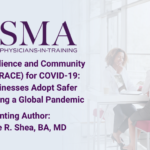Abstract | May 3, 2021
Business Resilience and Community Education (BRACE) for COVID-19: Helping Businesses Adopt Safer Practices During a Global Pandemic
Learning Objectives
- The audience will be able to better identify the needs of their community’s small businesses and subsequently apply meaningful protocols for change;
- Medical students especially will be able to implement new strategies to help their community’s small businesses during the COVID-19 pandemiC;
- The audience will examine methods to engage with their community as healthcare leaders.
Background:
New Orleans, Louisiana is no stranger to disaster, yet nothing prepared this city for the impact of the COVID-19 pandemic, which hit the community as swiftly and forcefully as a category 5 storm. In April 2020, businesses lacked trusted sources of information and direction on how to proceed in this unfamiliar and ever-changing landscape. Business Resilience and Community Education (BRACE) for COVID-19 was founded to prioritize the needs of the small business community to help them process the flood of information and misinformation disseminated throughout the COVID-19 pandemic. BRACE aimed to empower small businesses to implement safer business practices to protect employees, customers, and the New Orleans community.
Design:
The project progressed through 7 distinct phases: (1) Needs assessment within the New Orleans business community; (2) Creation of a business reopening guide; (3) Expansion of community partnerships; (4) In-person business canvassing; (5) In-person and virtual business consultation services; (6) Creation of BRACE pledge; (7) Continued COVID-19 education with a focus on vaccine information and access. Results/Impact: In our Phase 1 assessment, over 68% of respondents indicated that no organization had yet provided guidance on how to navigate the new restrictions. While over 84% of respondents noted that they had policies for employee use of personal protective equipment and hand sanitizer and indicated extra cleaning of high touch surfaces, only 50% provided hand sanitizer for customers and 40% were actively screening employees for illness. Almost 44% of respondents did not yet have a protocol in place for determining when an employee could return to work after illness. We have conducted 30 in-person and 20 virtual consultations to date, and 42 businesses have taken the BRACE pledge. The program has been endorsed by city and state health department officials for local business guidance.
Conclusion:
BRACE has worked directly with over 40 businesses and become a trusted resource to educate and empower businesses. Our consultations and BRACE pledge provide a malleable model to increase awareness, education, and safer COVID-19 practices across the entire business sector and can be expanded to reach communities across the state, nation, and around the globe.

